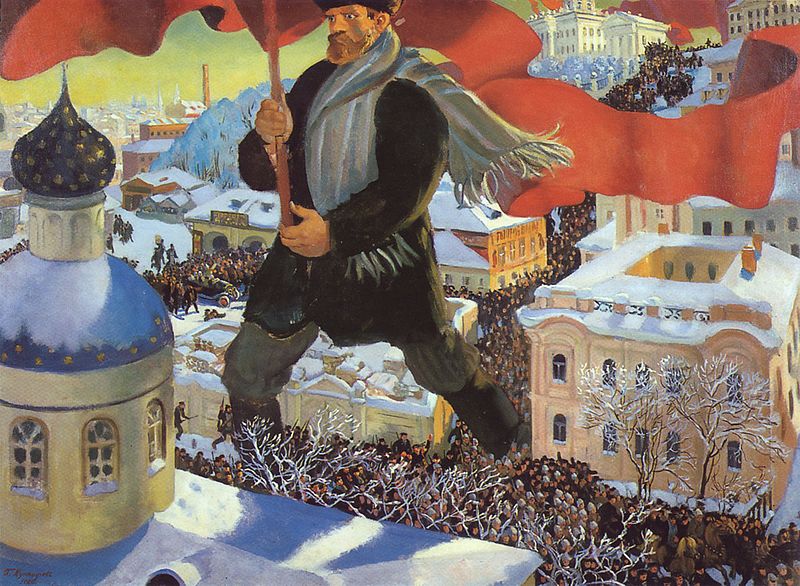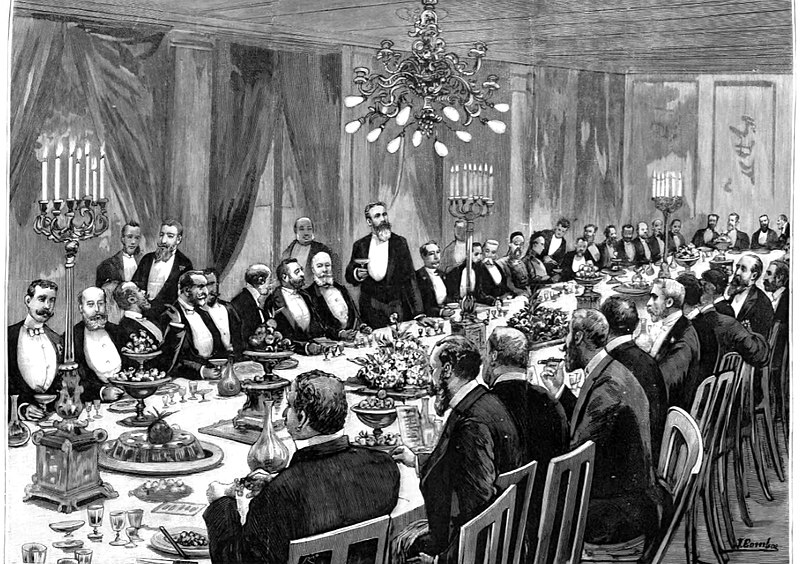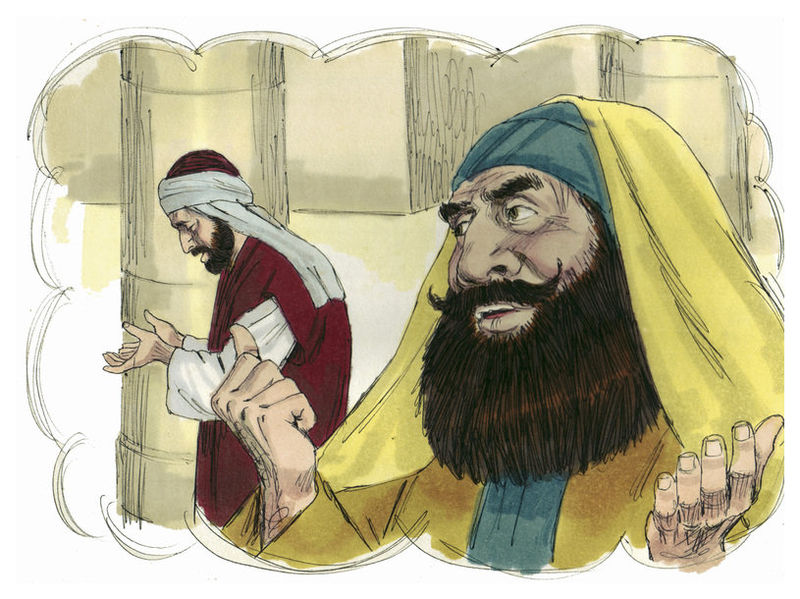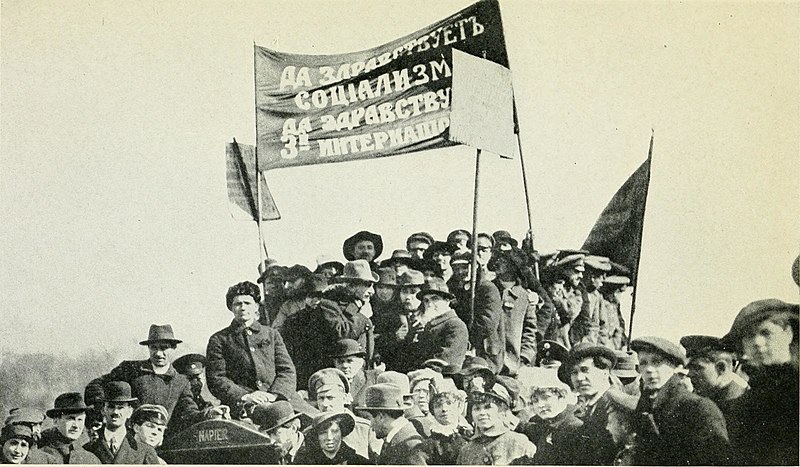
Karl Marx (1818-1883) was born into a family of Jewish scholars. His paternal grandfather served as rabbi until his death. His mother came from a long line of rabbis originally stemming from a Talmudic college in Italy. However, Marx’s father, influenced by Voltaire, ensured that Karl received his education in a school dominated by liberal humanism.
Karl Marx, as a young man became an avid student of philosophy. However, later he became critical of philosophy because, as he put it
philosophers have only interpreted the world in various ways, the point is to change it
Karl Marx. Thesis 11, Theses on Feuerbach 1845
So Marx set out to change the world and did so through his writings, the most well-known being “The Communist Manifesto” and “Das Kapital”, the latter volumes published by his colleague Freidrich Engels.
These writings served as the ideology for Communist revolutions which swept through the world in the 20th century setting up a new kind of government.

Karl Marx – secular rabbi pushing for a Kingdom of Man via Revolution

Though anti-religious, and adopting a ‘scientific’ stance, Marx displayed the greatest of religious faith – simply just not for theistic religion. Marx explained human history by theorizing that social classes conflict with each other across all societies. In his view, the working class of his day (the proletariat) would overthrow the bourgeoisie (the rich class with money who controlled the means of production). He campaigned for a violent revolution and overthrow of the bourgeoisie by the workers. Lenin and Trotsky first implemented his ideas, leading the Bolshevik revolution of 1917 in Russia which launched the Soviet Union. Others followed making Marx one of the foremost world-changers of the 20th Century.
You might think that since Marx claimed a scientific basis for his theories he would have thoroughly studied and intermingled with the workers of his day. But Marx did not use a scientific methodology, but rather used a rabbinical one. He never set foot in a factory. Instead he locked himself away in libraries to read about workers, as rabbis lock themselves away for Talmud study. In his reading he simply went through and accepted material that would ‘prove’ what he already believed. In this manner he displayed a zealous religious faith in his ideas.
Marx viewed history as an inevitable push to progress by revolution. Ever active social laws governed this progress. His writings read like an atheist’s Torah; like a religious work with control exercised, not by G-d, but by the intelligentsia which mastered his writings.
Mankind’s Quest for a Just society
Jews have been at the forefront of mankind’s search for good and just political governance. Karl Marx is a prominent example of this, being one of the most influential people on the 20th century.
Yeshua of Nazareth also taught on bringing about a just and good society. But Yeshua taught that a society of shalom (peace and abundance) would come with the ‘Kingdom of G-d’. Like Marx, he saw himself as leader in establishing this new society. But he did not pioneer its coming by locking himself away reading and writing as Marx did. Rather he lived with those he sought to influence and taught them directly about the Kingdom of G-d. We continue exploring Yeshua of Nazareth portrayed in the Gospels.
Yeshua and the Kingdom of G-d
Yeshua had authority such that diseases and even nature obeyed his command. He also taught in the Sermon on the Mount how Kingdom citizens should love one another. Love rather than revolution was the basis for the society that Yeshua foresaw. Think of the misery, death, injustice and horror we experience today because we do not follow this teaching.
Different than Marx, Yeshua used the picture of a festive party to explain the Kingdom’s advance, not a class struggle. The means to this party was not revolution of one social class imposing itself on another class. Instead, invitations widely distributed with freedom for acceptance or rejection would establish His Kingdom.
Parable of the Great Party
Yeshua pictured a great party to illustrate how wide and far the invitation to the Kingdom reaches. But the responses do not go as we expect. The Gospel recounts:
Hearing this, a man sitting at the table with Jesus exclaimed, “What a blessing it will be to attend a banquet in the Kingdom of God!”

16 Jesus replied with this story: “A man prepared a great feast and sent out many invitations. 17 When the banquet was ready, he sent his servant to tell the guests, ‘Come, the banquet is ready.’ 18 But they all began making excuses. One said, ‘I have just bought a field and must inspect it. Please excuse me.’ 19 Another said, ‘I have just bought five pairs of oxen, and I want to try them out. Please excuse me.’ 20 Another said, ‘I just got married, so I can’t come.’
21 “The servant returned and told his master what they had said. His master was furious and said, ‘Go quickly into the streets and alleys of the town and invite the poor, the crippled, the blind, and the lame.’ 22 After the servant had done this, he reported, ‘There is still room for more.’ 23 So his master said, ‘Go out into the country lanes and behind the hedges and urge anyone you find to come, so that the house will be full. 24 For none of those I first invited will get even the smallest taste of my banquet.’”
Luke14:15-24
The Great Reversal: The Invited Refuse
Our accepted understandings are turned upside down – many times – in this story. First, we might assume that G-d will not invite many into His Kingdom (which is the Banquet in the House) because he does not find many worthy people.
That is wrong.
The invitation to the Banquet goes to many, many people. The Master (G-d in this story) wants the Banquet to be full.
But an unexpected twist occurs. Very few of the guests actually want to come. Instead they made excuses so they do not have to attend! And think how unreasonable the excuses are. Who would buy oxen without first having tried them out before he bought them? Who would buy a field without first already looking it over? No, these excuses revealed the true intentions of the hearts of the guests – they were not interested in the Kingdom of G-d but had other interests instead.
The Rejected Accept
Just when we think that perhaps the Master will be frustrated with so few attending the banquet there is another twist. Now the ‘unlikely’ people, those who we all dismiss in our minds as being unworthy of being invited to a great celebration, those who are in “streets and alleys” and far-away “roads and country lanes”, who are “poor, crippled, blind and lame” – those we often stay away from – they get invitations to the banquet. The invitations to this banquet go much further, and cover more people than you and I would have thought possible. The Master of the Banquet wants people there and will even invite those we ourselves would not invite into our house.
And these people come! They have no other competing interests to distract their love so they come to the banquet. The Kingdom of G-d is full and the Master’s will is accomplished!
Yeshua told this parable to get us to ask a question: “Would I accept an invitation to the Kingdom of G-d if I got one?” Or would a competing interest or love cause you to make an excuse and decline the invitation? You and I are invited to this Kingdom Banquet, but the reality is that most of us will decline the invitation for one reason or another. We would never say ‘no’ directly so we offer excuses to hide our rejection. Deep down inside we have other ‘loves’ that are at the roots of our rejection. In this parable the root of the rejection was love of other things. Those who were first invited loved the things of this world (represented by the ‘field’, ‘oxen’ and ‘marriage’) more than the Kingdom of G-d.
Parable of the Unjustified Priest
Some of us love things in this world more than the Kingdom of G-d and so we will refuse this invitation. Others love or trust our own righteous merit. Yeshua also taught about this in another story using a religious leader as an example:

Then Jesus told this story to some who had great confidence in their own righteousness and scorned everyone else: 10 “Two men went to the Temple to pray. One was a Pharisee, and the other was a despised tax collector. 11 The Pharisee stood by himself and prayed this prayer: ‘I thank you, God, that I am not like other people—cheaters, sinners, adulterers. I’m certainly not like that tax collector! 12 I fast twice a week, and I give you a tenth of my income.’
13 “But the tax collector stood at a distance and dared not even lift his eyes to heaven as he prayed. Instead, he beat his chest in sorrow, saying, ‘O God, be merciful to me, for I am a sinner.’ 14 I tell you, this sinner, not the Pharisee, returned home justified before God. For those who exalt themselves will be humbled, and those who humble themselves will be exalted.”
Luke18: 9-14
We bar our own entry
Here a Pharisee (a religious teacher like a rabbi) seemed to be perfect in his religious effort and merit. His fasting and alms-giving were even more than required. But he placed his confidence in his own righteousness. This was not what Avraham (Abraham) had shown so long before when he received righteousness simply by humble trust in the promise of G-d. In fact, the tax collector (an immoral profession at that time) humbly asked for mercy. Trusting that he had been given mercy he went home ‘justified’ – right with G-d – while the Pharisee (rabbi), who we assume is ‘right with G-d’ still has his sins still counted against him.
So Yeshua asks you and me if we really desire the Kingdom of G-d, or if it is just an interest among lots of other interests. He also asks us what we are trusting in – our merit or G-d’s mercy.

Internet Archive Book Images, PD-US-expired, via Wikimedia Commons
The Ideal Communist State
Marxist doctrine taught that a class revolution would bring about the best of human society. Yeshua taught that the Kingdom of G-d would advance by simply accepting its invitation. The annals of history across the world document the unspeakable horrors and killings that Marxism unleashed on the world. Compare that with the society that the immediate followers of Yeshua established just after his departure.
And all the believers met together in one place and shared everything they had. 45 They sold their property and possessions and shared the money with those in need. 46 They worshiped together at the Temple each day, met in homes for the Lord’s Supper, and shared their meals with great joy and generosity— 47 all the while praising God and enjoying the goodwill of all the people. And each day the Lord added to their fellowship those who were being saved.
Acts 2:44-47
These people lived out the slogan that Marx espoused
From each according to his ability, to each according to his needs
Karl Marx, 1875, Critique of the Gotha Program
These people forged a society that Marx dreamt about but Marx’s followers could not achieve in spite of untold attempts.
Why?
Marx failed to see the kind of revolution required to bring about an egalitarian society. We likewise are in danger of failing to see the revolution required. This revolution was not at the level of one class of people against another as Marx taught, but rather in the psyche of every single person contemplating their invitation into G-d’s Kingdom. We see this clearly when we compare what Yeshua taught about the psyche when compared to that other great Jewish thinking of the human psyche – Sigmund Freud.